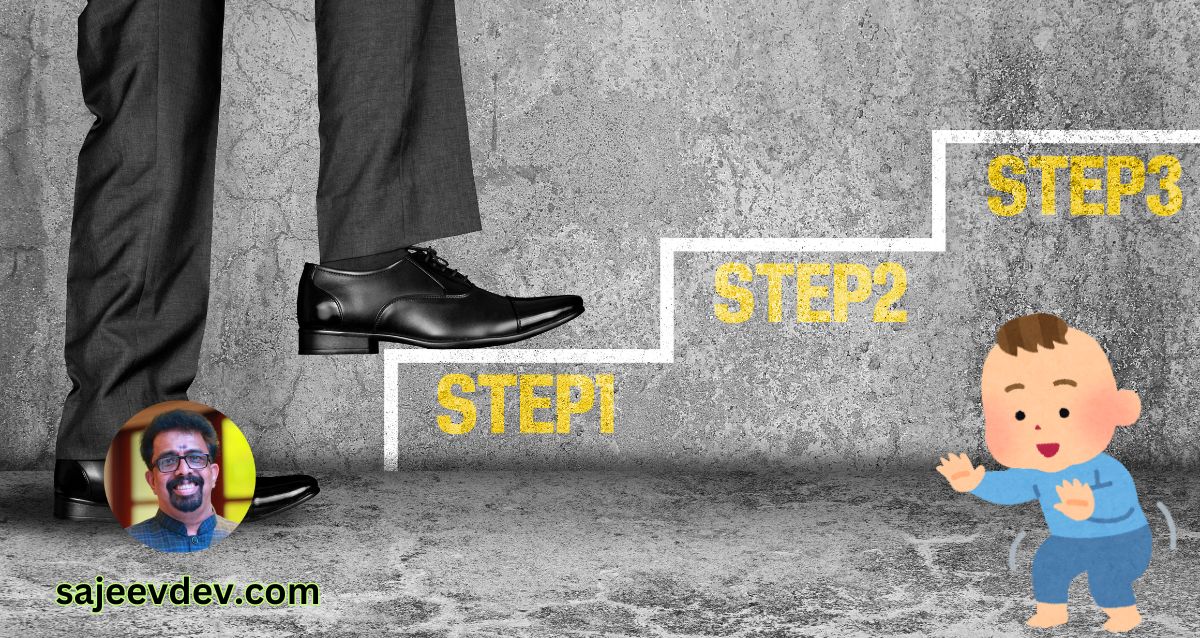The decision to embark on a new journey, be it personal or professional, often encounters significant psychological barrier
The decision to embark on a new journey, be it personal or professional, often encounters significant psychological barriers. A prevalent emotion that individuals face is the fear of failure. This apprehension stems from the belief that one may not meet their expectations or those of others. Such fears can hinder progress, causing individuals to second-guess their readiness to begin. For instance, an aspiring entrepreneur might refrain from launching a business due to the daunting possibility of financial loss and public scrutiny.
Additionally, the fear of the unknown plays a critical role in the decision to delay taking action. Engaging in unfamiliar territories can induce anxiety, as individuals grapple with uncertainty about outcomes and their capacity to adapt. A notable example can be observed in individuals contemplating career changes; they often prefer to remain in their current roles, despite dissatisfaction, due to the unpredictability associated with new opportunities.
Self-doubt also serves as a formidable barrier. Many find themselves trapped in a cycle of negative self-talk and beliefs about their capabilities. For example, a writer may experience crippling self-doubt about their talent and hesitate to share their work, fearing it will be rejected. This internal dialogue can discourage even the most talented individuals from stepping forward.
Moreover, societal pressures can exacerbate these fears. The expectation to achieve immediate success often creates added stress, further diminishing one’s willingness to start. This combination of fear of failure, fear of the unknown, and self-doubt can ultimately paralyze progress, rendering individuals inactive in the face of their ambitions.
Recognizing these psychological barriers is essential, as understanding the root of such fears can empower individuals to address and overcome them. Only by confronting these obstacles can one truly take the first step towards meaningful change.
The Importance of Taking That First Step
Embarking on any journey, no matter how grand or modest, necessitates a pivotal initial action—often referred to as the “first step.” This primary action is not merely a procedural formality; rather, it establishes the framework for subsequent endeavors and reinforces the concept that every achievement is rooted in the decision to advance. When individuals choose to engage actively, they set in motion a sequence of events that can lead to remarkable progress.
Importantly, the first step plays a crucial role in creating momentum. Momentum is the force that propels an individual forward; it is born from the initiation of action and grows stronger with each successive step taken. When a person decides to act, however small the action may seem, they begin to cultivate an energy that encourages further efforts. This cascading effect is essential, particularly in contexts where the path may seem overwhelming. The act of moving forward, even incrementally, fosters a sense of achievement and encourages continued engagement in the task at hand.
Additionally, taking that initial step significantly contributes to building confidence. Each action reinforces belief in one’s abilities and establishes a positive feedback loop. For instance, successfully completing an initial task can inspire individuals to tackle more complex challenges. This growing confidence not only sustains the momentum generated but also enhances problem-solving skills and cultivates resilience. Ultimately, the first step is not merely about progress; it symbolizes a commitment to the journey. It marks the transition from contemplation to action, paving the way for future accomplishments and ensuring that lofty goals become attainable.
Strategies to Overcome the Hesitation
Overcoming hesitation can often be one of the most challenging aspects of embarking on a new journey. However, there are several effective strategies that individuals can implement to conquer their mental barriers and initiate action. One of the most productive approaches is to set small, achievable goals. By breaking down larger tasks into manageable steps, individuals can create a sense of progress and motivation. For instance, if the objective is to write a book, committing to write just a paragraph or a page each day can make the task seem less daunting. Celebrating these small victories reinforces a sense of accomplishment and encourages continued effort.
Another valuable technique is visualization. This involves picturing the desired outcome and imagining oneself experiencing the success associated with the completion of a task. By regularly engaging in visualization exercises, individuals can bolster their motivation and reduce anxiety by mentally rehearsing the steps necessary to reach their goals. When one can see themselves succeeding, it often translates into increased confidence and willingness to take that initial step.
Furthermore, leveraging accountability partners can significantly reduce the tendency to procrastinate. By sharing goals with a trusted friend or mentor, individuals are more likely to stay committed due to the external encouragement and support. Accountability creates a sense of responsibility; knowing that someone else is following your progress can motivate you to push through hesitation. This social commitment can serve as a powerful reminder of the importance of starting and sustaining the journey.
Implementing these strategies, such as setting small goals, visualizing success, and utilizing accountability partners, can significantly ease the transition from hesitation to action, enabling individuals to embrace the possibilities that lie ahead.
Real-Life Inspirations: Stories of Successful Starts
The journey of success is often paved with obstacles and uncertainties, even for those who are now celebrated figures. Many successful individuals have faced significant challenges before they took their first crucial step. Consider the story of J.K. Rowling, the author of the Harry Potter series. Before her meteoric rise to fame, Rowling was a single mother living on welfare, struggling to make ends meet. Despite the numerous rejections from publishers, she persevered and continued to write, ultimately transforming her struggles into one of the most successful book franchises in history.
Similarly, Oprah Winfrey’s rise to prominence is a testament to the power of overcoming adversity. Raised in poverty and facing a tumultuous childhood, Oprah took her first step into the media world by seeking opportunities in journalism. Her determination and resilience allowed her to navigate the hardships of her early life and ultimately led to her becoming a media mogul and a source of inspiration for millions.
Everyday individuals also provide powerful narratives about the importance of taking that first step. Take, for example, the story of a man named John, who, after years in a monotonous job, decided to follow his passion for cooking. Despite his fears and the uncertainty of starting a business, John enrolled in culinary school. His commitment to pursuing his goal led to him opening a successful restaurant that has now won multiple awards. John’s story highlights that no matter one’s background or the challenges faced, the act of starting can lead to unforeseen achievements and fulfillment.
Through these inspiring accounts, it becomes evident that successful beginnings, whether from renowned figures or ordinary people, often emerge from environments laden with challenges. They remind us that the initial step, albeit daunting, is essential in realizing aspirations and that resilience plays a key role in transforming dreams into reality.
The Ripple Effect of Starting
Taking the first step in any journey is more than merely a preliminary action; it is the catalyst that sets into motion a series of developments in various aspects of life. This initial undertaking generates momentum, which can lead to additional actions and achievements—essentially creating a ripple effect. When an individual decides to initiate a change, it often leads to a domino effect, whereby one positive change inspires another.
For instance, consider someone who decides to adopt a healthier lifestyle. The first step, whether it is a simple decision to exercise or modify dietary choices, often leads to further enhancements. This initiative may stimulate a commitment to regular workouts, improved meal planning, and even a shift in social circles toward like-minded individuals. Each subsequent action reinforces the habit, creating a cycle of improvement wherein the individual not only adopts a healthier routine but also experiences broader benefits, such as increased energy levels and enhanced mental well-being.
Moreover, initiating change fosters a sense of accomplishment and confidence, serving as a psychological catalyst for further endeavors. Success in one domain can translate into motivation in other areas—be it career advancements, personal relationships, or skill development. When people experience the positive outcomes from one small stride, they are likely to seek additional opportunities for growth, creating a compounding effect over time.
Ultimately, the act of starting embodies the principle that momentum breeds momentum. By acknowledging that the initial step can lead to a series of constructive changes, individuals can harness the power of starting to unlock their potential and cultivate a life marked by continuous progress. Embracing this perspective allows one to appreciate that every significant transformation begins with a single, decisive action.
Embracing the Process: The Journey Beyond the First Step
Taking the first step towards any goal is undeniably significant; however, it is merely the inception of a much broader journey. What follows is a complex landscape of challenges, progress, and learning experiences that can define the ultimate success of an endeavor. While initiating action is a crucial milestone, sustaining one’s enthusiasm and commitment through inevitable hurdles is equally important. It is essential to recognize that a journey does not end with the first step; rather, it marks the beginning of ongoing effort and perseverance.
As individuals embark on their pursuits, they will undoubtedly encounter obstacles. These may take the form of self-doubt, unforeseen challenges, or shifting priorities, all of which can dampen motivation. To navigate these difficulties effectively, individuals must cultivate resilience. Setting incremental goals can significantly aid in maintaining focus. By breaking the main objective into smaller, manageable tasks, the sense of achievement rises with each completed goal, thereby fueling continued motivation.
Additionally, it’s vital to develop a strong support network. Engaging with friends, family, or like-minded individuals can provide encouragement during tough times. Sharing experiences not only diminishes feelings of isolation but can also open the door to new strategies for overcoming hurdles. Seeking mentorship or guidance from those who have undertaken similar journeys can offer valuable insights and foster a sense of accountability.
Lastly, keeping a reflective practice such as journaling can enhance awareness of progress made thus far. Regularly documenting thoughts and feelings about the journey fosters a deeper connection to the process and aids in recognizing personal growth. This self-reflection can serve as a reminder of past achievements even when the road ahead appears daunting. In conclusion, embracing the process after taking the first step is essential to achieving lasting success. By nurturing motivation, building support systems, and engaging in self-reflection, individuals can navigate the complexities of their journeys effectively.
Common Pitfalls After the First Step
After taking the initial step towards a goal, many individuals find themselves facing unexpected challenges that can hinder their progress. One of the most prevalent pitfalls is discouragement. This often stems from the realization that meaningful change or improvement does not occur overnight. Individuals may feel overwhelmed by the magnitude of the journey ahead, leading to a sense of frustration and a tendency to question their initial motivation. Recognizing that setbacks are a natural part of the process can help combat these feelings. Maintaining a positive mindset and celebrating small victories can provide the necessary encouragement to keep moving forward.
Distractions also pose a significant threat to the journey following that crucial first step. In our fast-paced world, it is easy to become sidetracked by various external factors, such as social media, work commitments, or unforeseen personal responsibilities. These distractions can dilute focus and strain motivation, making it difficult to remain committed to one’s goals. To counteract this issue, individuals are encouraged to create a structured plan that outlines specific tasks and timelines. By establishing a prioritized list of activities that align with the overarching goal, it becomes easier to maintain focus while minimizing the influence of external distractions.
Another common temptation encountered is the urge to give up. As challenges arise, it is natural to contemplate whether the effort invested is worth the potential rewards. This moment of doubt can lead to the dangerous thought that it may be easier to abandon the pursuit altogether. To navigate this hurdle, individuals should remind themselves of the reasons they embarked on the journey in the first place. Visualization techniques, where one imagines the end goal and the satisfaction it would bring, can help reinforce commitment. Seeking support from others who share similar aspirations can also provide motivation and accountability, ensuring that the journey continues despite obstacles.
The Role of Mindset in Taking That First Step
Mindset plays a pivotal role in influencing our ability to initiate any journey, significantly impacting our motivations and aspirations. The difference between a growth mindset and a fixed mindset serves as a primary factor in determining one’s willingness to embrace the challenges that come with starting something new. A growth mindset perceives abilities and intelligence as qualities that can be developed through dedication and perseverance. This outlook fosters resilience, empowering individuals to start new projects or ventures without the fear of failure overshadowing their potential.
Conversely, a fixed mindset views abilities as static and unchangeable traits. Individuals with this mindset may feel discouraged when faced with obstacles, fearing that their inherent limitations will prevent them from succeeding. Consequently, this attitude can hinder one’s ability to take that first step, as the perception of challenges transforms into a daunting barrier rather than an opportunity for growth. Understanding and recognizing which mindset governs our way of thinking can ultimately dictate our readiness to embark on new endeavors.
The beliefs we uphold regarding our capability can transform how we approach starting any journey. Those with a growth mindset are more likely to view the act of beginning as a valuable learning experience rather than a risk of failure. This perspective not only enhances motivation but also cultivates a sense of curiosity and exploration. Furthermore, a positive mindset promotes constructive self-talk, encouraging individuals to embrace discomfort as a natural aspect of growth, thus boosting their willingness to step outside their comfort zone.
In summation, cultivating a growth-oriented mindset is essential in shaping our attitudes toward taking that crucial first step. By fostering an environment of positivity and resilience, individuals can empower themselves to overcome uncertainties and embrace the journey ahead.
Celebrating the Courage to Start
Throughout this discussion, we have emphasized the significance of initiating any journey, regardless of its nature or scope. The first step represents an act of courage and a fundamental commitment to change, progress, or personal growth. It is vital to recognize that every significant achievement begins with that initial action. By understanding the psychological and emotional barriers that often accompany this first step, individuals can appreciate the brave decision to embark on new paths.
The journey of self-improvement, career development, or creative endeavors begins when one decides to take action. This moment can often be overshadowed by fear and uncertainty; however, it is essential to view the first step not merely as a precursor to future successes but as a worthy accomplishment in itself. Embracing this perspective allows individuals to cultivate a mindset that celebrates intention and effort, fostering resilience against challenges that may arise in subsequent phases of their journeys.
Moreover, encouraging oneself and others to recognize the bravery involved in starting something new promotes a culture of support and motivation. We must share our stories and experiences, highlighting the struggles and triumphs of beginning anew. Remember, every expert was once a beginner, and every successful journey is paved with numerous initial steps, each worthy of recognition and celebration.
In closing, let us honor the courage it takes to commence any journey. Whether you are contemplating a personal transformation, pursuing education, or launching a creative project, acknowledge that taking that first step is a victory. Embrace your journey, trust in your abilities, and celebrate each step forward, no matter how small. Each moment of courage is a crucial milestone in your path to achievement.









